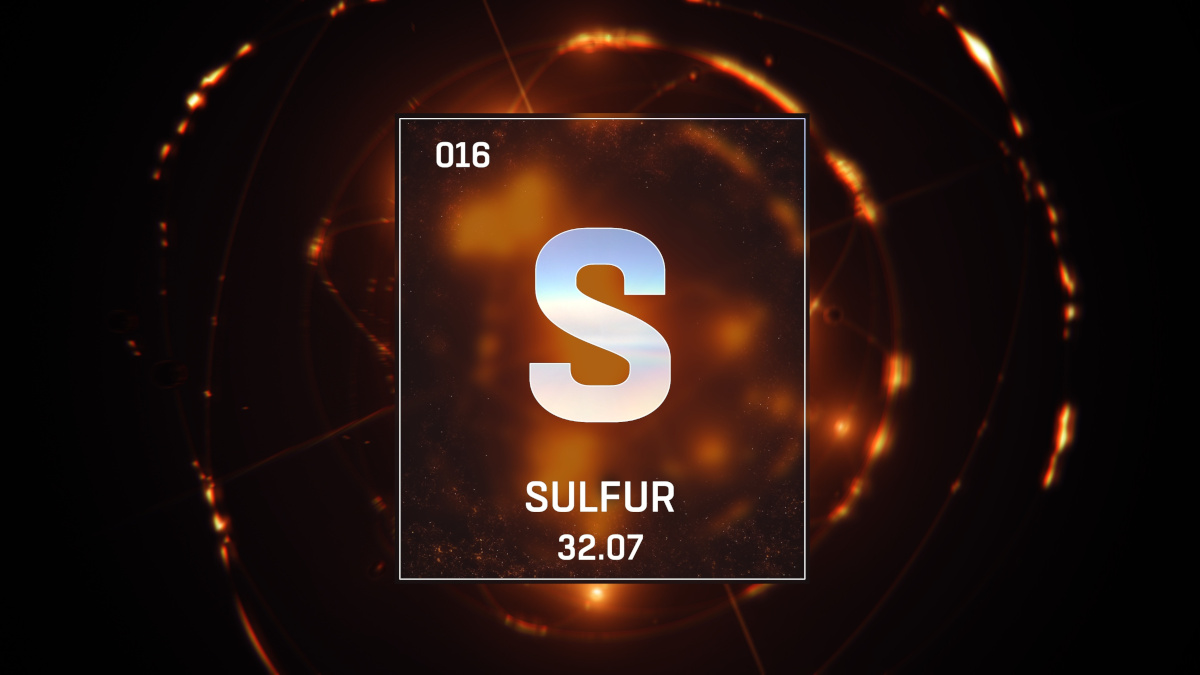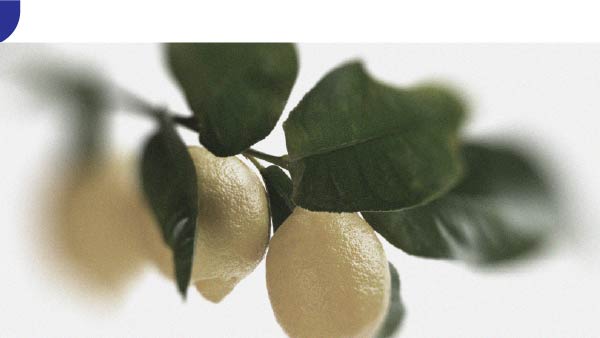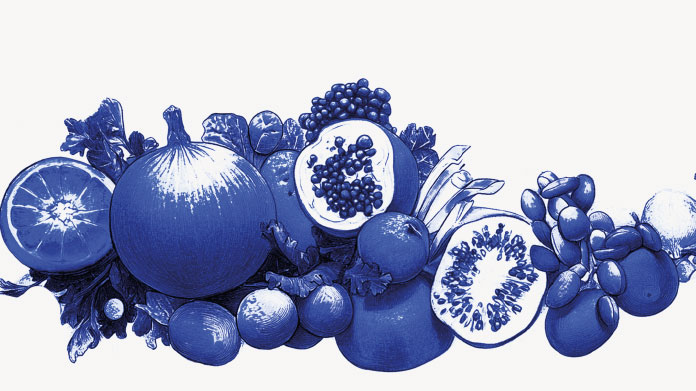The top 10 sulfur-rich foods
Though it has a somewhat ‘sulfurous’ reputation, sulfur is nonetheless an essential nutrient for health, with an affinity for the joints. Discover the 10 best foods for stocking up on this valuable compound.

Recap: what is sulfur’s role in the body?
The third most abundant mineral in the body after calcium and phosphorus, sulfur (which has the chemical symbol S) is defined more specifically as a trace-element or macro-element: it generally represents 0.3% of bodyweight. It is also classified as essential, in that we are unable to produce it ourselves. (1). Sulfur plays a major role in the body’s biological processes, and is thus a prime compound.
Located in a number of body tissues, it forms part of the composition of keratin in the skin, hair and nails and chondroitin sulphate in joint cartilage. Truly ubiquitous, it also forms part of the structure of sulfur-containing amino acids (such as methionine and cysteine), the building blocks of proteins, as well of that of vitamins B1 and B8. And the ultimate proof of its importance is that it plays a role in no fewer than 400 different enzymatic reactions.
Despite its many qualities, sulfur suffers from a somewhat tarnished image, primarily because sulfur dioxide, the gas produced when sulfur is burned, gives rise to the infamous sulfites of the agro-food industry, much-criticised for their allergenic nature (2). It’s also because once it’s reduced to a powder and burned, it gives off toxic, foul-smelling fumes which are diverted for military purposes.
However, it’s important to distinguish this from the sulfur provided naturally by the diet, which remains essential for meeting our physiological needs (3). Even though health authorities have not established a daily reference intake for sulfur, WHO experts agree on nutritional recommendations of 13mg sulfur-containing amino acids per kilo a day for adults (4).
Present at trace levels in all foods, sulfur is found at higher levels in certain foodstuffs (5). So here, at last, is the sulfur top 10!
The top 10 sulfur-rich foods
10- Rice
A staple of Asian cuisine, long-grain rice contains approximately 35mg of sulfur per 100g. Like all grains, it contains sulfur-containing amino acids (methionine and cysteine), which pulses mostly lack. That’s why vegetarians eat them together to reform complete proteins!
9- Red onions
Part of the Alliaceae family, onions contain sulfur in the form of particular compounds called allyl sulfides (6-7). However, it’s only when they’re cut, that they really become active (and, by the way, make us cry).
While all varieties of onion contain a tiny amount, red onions are a little in front with close to 50mg of sulfur per 100g.
8- Garlic
Slightly ahead of onions comes garlic with almost 64mg of sulfur per 100g. There’s significant scientific interest in this little bulb because of its content in alliin which when crushed, is converted into allicin, a valuable sulfur-containing compound (8).
7- Eggs
Containing all the essential amino acids, eggs provide a sizeable amount of sulfur with 125mg per 100g! A great alternative to meat, particularly for vegetarians.
Make sure to eat the yolk too, as it contains more of the methionine/cysteine combo, weight for weight, than the white (9).
6- Broccoli
That smell of broccoli when it’s cooking? Once again, that’s sulfur! With a considerable 140mg per 100g, this cruciferous vegetable more than holds its own in the sulfur stakes. Its content of the much-studied sulfur-containing compounds glucosinolates, makes this a constantly ‘high-profile’ vegetable (10). Lightly steam the florets till tender so as not to lose their value.
It’s worth noting that all the other members of the Brassica family (such as cauliflower, Brussels sprouts, turnips and radishes) also acquit themselves well in terms of sulfur content.
5- Pumpkin seeds
Rich in vitamins (A, C, B1, B2, B9 and E), as well as minerals and fibre, the pumpkin seed is certainly no slouch when it comes to sulfur with a very decent 146mg per 100g, like most oilseeds (nuts, sesame seeds, peanuts …).
Add a handful to your bread or muffin dough to add crunch and nutrition!
4- Calves’ liver
Not crazy about offal? That’s a shame, because with a considerable 199mg per 100g, calves’ liver is one of the most sulfur-rich foods, with an excellent nutritional profile to boot. The more adventurous among you could also try kidneys or hearts, for a bit of variety …
3- Beef
A rib steak is often a more popular choice than offal. Which is interesting, as beef is neck-and-neck with calves’ liver when it comes to sulfur content with almost 200mg per 100g.
That doesn’t mean you should eat it to excess: according to the French Agency for Food, Environmental and Occupational Health & Safety (ANSES) you should not exceed 500g of red meat a week(11).
2- Cod
The ultimate lean fish, cod is in silver medal position when it comes to providing sulfur with 260mg per 100g. Very low in calories, it also contains vitamin B12, iodine and selenium (12).
Take care, however, with salt cod: though it’s essentially the same fish, its salted, dried flesh can significantly raise your sodium levels.
1- Seafood
Whether crustaceans or shellfish,seafood comes in at first place. While there are few available studies on their sulfur content, it seems that certain species such as lobster, crab and clams, have almost 500mg per 100g. An excellent reason to treat yourself to a seafood platter from time to time!
Increase your intake of MSM, an exceptional form of sulfur
To go further ... have you heard about methyl-sulfonyl-methane, or MSM? This natural form of organic sulfur is a precursor of mucopolysaccharides, key substances for joint health (like chondroitin, glucosamine and hyaluronic acid) (13-14).
Present at trace levels in many foods, and abundant in the milk of mammals, MSM has been available as a dietary supplement since the 1990s. However, there are significant differences in how it is manufactured, which directly affects it purity and safety.
So if you want to take an MSM supplement, make sure you choose one where the molecules are isolated without crystallisation to protect yourself from heavy metals and other contaminants (try, for example, the product OptiMSM®, the purest MSM supplement on the market, produced using heat distillation only, with no controversial solvents).
References
- Parcell S. Sulfur in human nutrition and applications in medicine. Altern Med Rev. 2002 Feb;7(1):22-44. PMID: 11896744.
- Vally H, Misso NL, Madan V. Clinical effects of sulphite additives. Clin Exp Allergy. 2009 Nov;39(11):1643-51. doi: 10.1111/j.1365-2222.2009.03362.x. Epub 2009 Sep 22. PMID: 19775253.
- Parcell S. Sulfur in human nutrition and applications in medicine. Altern Med Rev. 2002 Feb;7(1):22-44. PMID: 11896744.
- van de Poll MC, Dejong CH, Soeters PB. Adequate range for sulfur-containing amino acids and biomarkers for their excess: lessons from enteral and parenteral nutrition. J Nutr. 2006 Jun;136(6 Suppl):1694S-1700S. doi: 10.1093/jn/136.6.1694S. PMID: 16702341.
- Doleman JF, Grisar K, Van Liedekerke L, et al. The contribution of alliaceous and cruciferous vegetables to dietary sulphur intake. Food Chem. 2017;234:38-45. doi:10.1016/j.foodchem.2017.04.098
- Munday R, Munday CM. Relative activities of organosulfur compounds derived from onions and garlic in increasing tissue activities of quinone reductase and glutathione transferase in rat tissues. Nutr Cancer. 2001;40(2):205-10. doi: 10.1207/S15327914NC402_18. PMID: 11962257.
- Munday R, Munday CM. Relative activities of organosulfur compounds derived from onions and garlic in increasing tissue activities of quinone reductase and glutathione transferase in rat tissues. Nutr Cancer. 2001;40(2):205-10. doi: 10.1207/S15327914NC402_18. PMID: 11962257.
- Bayan L, Koulivand PH, Gorji A. Garlic: a review of potential therapeutic effects. Avicenna J Phytomed. 2014;4(1):1-14.
- Attia, Youssef A et al. “Protein and Amino Acid Content in Four Brands of Commercial Table Eggs in Retail Markets in Relation to Human Requirements.” Animals : an open access journal from MDPI 10,3 406. 1 Mar. 2020, doi:10.3390/ani10030406
- Connolly EL, Sim M, Travica N, et al. Glucosinolates From Cruciferous Vegetables and Their Potential Role in Chronic Disease: Investigating the Preclinical and Clinical Evidence. Front Pharmacol. 2021;12:767975. Published 2021 Oct 26. doi:10.3389/fphar.2021.767975
- Aykan NF. Red Meat and Colorectal Cancer. Oncol Rev. 2015;9(1):288. Published 2015 Dec 28. doi:10.4081/oncol.2015.288
- vegetables to dietary sulphur intake. Food Chem. 2017;234:38-45. doi:10.1016/j.foodchem.2017.04.098
- Butawan M, Benjamin RL, Bloomer RJ. Methylsulfonylmethane: Applications and Safety of a Novel Dietary Supplement. Nutrients. 2017;9(3):290. Published 2017 Mar 16. doi:10.3390/nu9030290
- Kim LS, Axelrod LJ, Howard P, Buratovich N, Waters RF. Efficacy of methylsulfonylmethane (MSM) in osteoarthritis pain of the knee: a pilot clinical trial. Osteoarthritis Cartilage. 2006 Mar;14(3):286-94. doi: 10.1016/j.joca.2005.10.003. Epub 2005 Nov 23. PMID: 16309928.
1 Days
great experience
Easy ordering, fast deliver, very professionally.
Natasa
4 Days
this company and its products are…
this company and its products are perfect: I have been their customer for three years , prices are reasonable for the high quality they offer , the products are of very good quality not just plainly "normal" , delivery is quite fast. we are very satisfied with them.
Gabriel Diacakis
5 Days
TOP service TOP products will buy again…
TOP service TOP products will buy again and again
PINOTTI Giorgio
7 Days
Trustworthy company with tested products
Trustworthy company with tested products
Trusted
11 Days
Efficiency and speed
Efficiency and speed
Cuccie
13 Days
GOOD BRAND IN FOOD COMPLEMENTS
GOOD BRAND IN FOOD COMPLEMENTS - SERIOUS WITH GOOD DOCUMENTS AND DETAILS SCIENTIST. AND SERIOUS HONNEST COMMERZIALISATION. I HAVE TRUST IN THEIR PRODUCTS.
FENOGLIO Guy
14 Days
Very good experience
Very good experience, the products arrived in time, in perfect condition and are good quality. Thank you.
GABI TIRCOCI
20 Days
very good expereince
very good expereince
Jelena Đaković
20 Days
Very good products.
Very good products.
Agnes BENDSAK
22 Days
Just OK
Just OK, ordering from company for many years and being safisfied
Lynn Mae
22 Days
Recomendo
Produtos encomendados são recebidos atempadamente e de acordo com o anunciado! Muito satisfeita!
Carla Sofia
23 Days
Everything is great!
Everything is great!
Jonas
28 Days
The delivery was fast and the product…
The delivery was fast and the product is great
SOMMARIVA Gianni
29 Days
Great service and lots of information
Great service and lots of information
Gabi
32 Days
Service Satisfaction
I’m satisfied with the service; it fulfilled what it set out to do.
Anfhony Abreu
of experience
your money back
##montant## purchase




